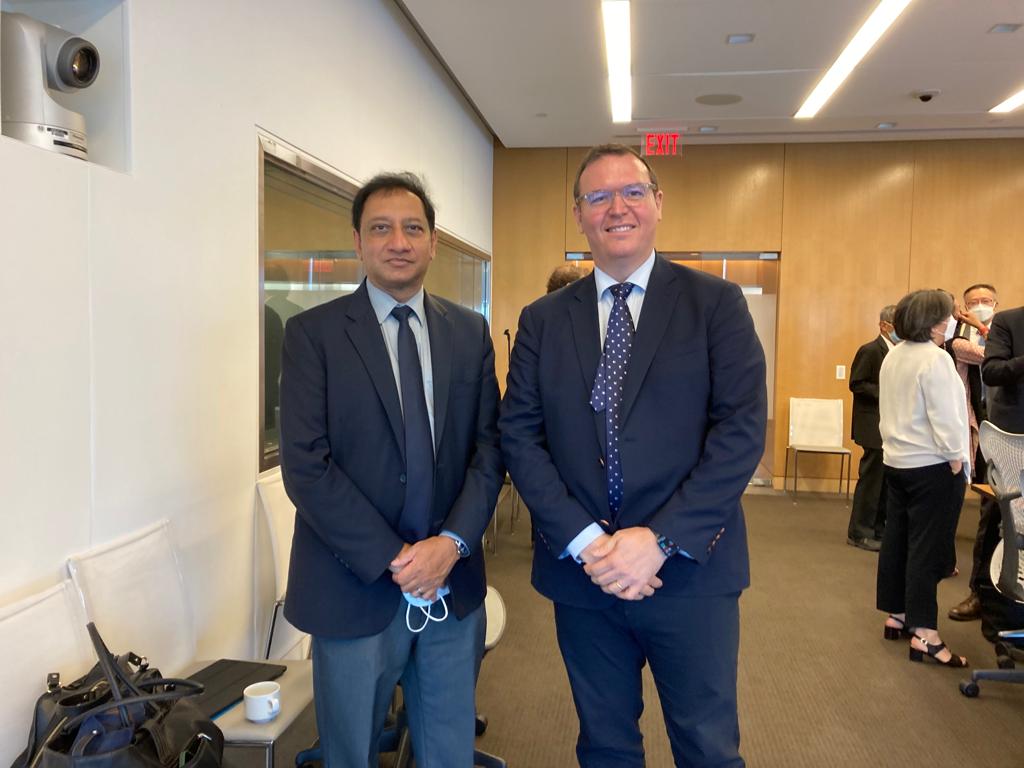IOE staff at the heart of international debate during ESS conference - IOE
Copenhaghen, 10 June 2022 – How to tackle the trade-offs between continuity and renewal in large international organizations' results and evaluation systems and practices; how to ensure evaluations fully encompass unintended consequences of any intervention to the natural environment and to vulnerable people; how to reflect the complexity of 21st century through the revision of evaluation polices; and how to create incentives for evaluators to adopt practices that can help organisations to achieve their transformative goals: these were the discussions that the Independent Office of Evaluation of IFAD (IOE) contributed to during the 14th European Evaluation Society (ESS) biennial conference.
This year’s ESS biennial conference saw the active involvement of IOE staff members in four events. On 8 June, Fabrizio Felloni, IOE Deputy Director, was a discussant in the session titled ‘Results and Evaluation Systems in Large International Organizations: Trade-offs between Continuity and Renewal’. The roundtable's objective was to identify barriers, opportunities, and solutions to implementing more transformative evaluation practices in large organizations. Discussions stemmed from the recognition that while the evaluation community is calling for evaluation to support the necessary transformation to a more just and sustainable future, it is not easy for large international organizations to transform their results measurement and evaluation practices.
On 9 July, Dr S. Nanthikesan, IOE Lead Evaluation Officer, was a panellist during the event titled ‘Mainstreaming the Environment into Evaluations: Perspectives from the UN’. He presented the pioneering systemic approach pursued by IFAD to integrate environment considerations in all its evaluations. This, as participants recognized that evaluation must ensure that it focuses on whether interventions make a positive contribution in the coupled human-natural systems. To do so, evaluation must expand its remit beyond the internal logic of interventions to assess the relevance, impact and effectiveness and to fully encompass unintended consequences of any intervention to the natural environment and to vulnerable people.
Later the same day, Fabrizio Felloni participated as a discussant in the session titled ‘From Neutral Observers to Advocates, Truth Speakers, and Agents Provocateurs: What Role Should Evaluators Play? Reflections Around Evaluation Policies’. During the roundtable, representatives of the evaluation offices of IFAD, FAO, WFP and CGIAR discussed the evolution of the evaluation function in response to current global challenges; the role of organizational evaluation policies in facilitating interdisciplinary approaches through transformative evaluations; the process of policy revision vis-à-vis the repositioning evaluation functions on lines of action that align to internal and external drivers; and the lessons learnt from operationalizing policies to maximize the use of evaluative evidence for decision-making.
Ms. Johanna Pennarz, IOE Lead Evaluation Officer, co-coordinated the session on ‘A Transformative Change in Development Evaluation: Opportunities and Challenges for Changing Practices, Mindsets and Values in International Organisations’, which took place on 10 June. However, Ms. Pennarz could not participate in the session, and on her behalf Dr S. Nanthikesan participated as a discussant. During the session, participants reflected on ways to overcome the resistance to transformative evaluations and create incentives for commissioners and evaluators to adopt evaluation practices that can help organisations to achieve their transformative goals. In particular, panel members aimed to uncover positive approaches to initiate and sustain changes within their respective organisations.
The EES was initiated in 1992 and registered in 1996 as a non-profit association. The mandate of the EES is to stimulate, guide and promote the theory, practice and utilization of evaluation in Europe and beyond. Held between 6 and 10 June 2022, in Copenhagen, the 14th ESS biennial conference focused on institutional, identity, content and methodological shifts aimed at transforming evaluators, as well as evaluation systems and methodologies.
For further information, please contact Alexander Voccia [here]
